By now you’re tired of hearing me say this, but you won’t believe…
…the things one couldn’t do without a Y chromosome when I was growing up.
My own parents were great—and a bit ahead of their time—at encouraging me not to be fenced in by my sex. I had backhoes and construction sets as well as dolls for toys. I was encouraged to climb trees—and mountains. But society at large was still severely restrictive.
In sixth grade I expressed the wish to be an astronaut, and was emphatically told by my (male) teacher that girls could never be astronauts, because all astronauts had to be test pilots, and test pilots were only men. (Take that, Sally Ride!) (More)
Permalink | Read 2690 times | Comments (2)
Category Children & Family Issues: [first] [previous] [next] [newest] The Good New Days: [first] [previous] [next] [newest]
Think “reproductive freedom” and what comes to mind? Birth control? Abortion-on-demand? The freedom, in short, not to reproduce while indulging in the activity specifically designed for reproduction?
What I’m thankful for is the inverse.
My generation grew up in the days of Ehrlich’s The Population Bomb and fears that the world would outgrow its food supply by the mid-1980s. It was seriously suggested that giving aid to distressed peoples was morally wrong, on the grounds that helping them now would only enable them to reproduce and then more people would starve to death later. (More)
Permalink | Read 2845 times | Comments (0)
Category Children & Family Issues: [first] [previous] [next] [newest] The Good New Days: [first] [previous] [next] [newest]
There’s no doubt the sociological upheavals caused by the so-called Women’s Liberation Movement have done much harm, but one great thing to come out of that time is a greater closeness between fathers and their children.
My father was always actively involved with his children—unusually so for that generation, I believe—even before my mother’s early death forced him to take on double parenting duty. And yet in his journals of our early years he always refers to the times my mother was not at home as times when he was “babysitting the children.” No one I know with young children in this century would even think such a thought, much less express it. How can one “babysit” one’s own child? (More)
Permalink | Read 2846 times | Comments (0)
Category Children & Family Issues: [first] [previous] [next] [newest] The Good New Days: [first] [previous] [next] [newest]
A couple of generations ago, overseas travel for pleasure was only for the rich. Even business travel was uncommon, unless one was a missionary or in the military. Today we visit our family in Switzerland more frequently, with less effort, and possibly even with less relative expense than my family travelled from New York to Florida to visit my grandparents when I was young.
Telephone service was once so expensive that long distance calls (remember long distance?) had to be kept brief—as in just a few minutes. Overseas calls were out of the question most of the time. Today our grandchildren have long conversations with us on the phone, and we can call Switzerland at six cents a minute. Skype costs even less (less as in free); the quality may not be as good as I'd like, but it allows us to see each other. The long-dreamed-of video phone is here! (More)
Permalink | Read 2514 times | Comments (0)
Category Children & Family Issues: [first] [previous] [next] [newest] The Good New Days: [first] [previous] [next] [newest]
Nobody likes to be sick, and especially nobody likes children to be sick. But if you are a child, today is a much better time than 50 years ago to face a mild illness. I don’t mean because of all the new vaccines—I actually look back with some fondness on the days of chicken pox, measles, and German measles. (I missed out on that other great disease of early childhood, mumps, despite repeated visits to my friend when she was afflicted.) Nor do I mean the obvious improvements in the treatment of many diseases, and in emergency medicine, not that I’m not grateful for them.
What I’m thankful for is that we have outgrown the sick-children-must-stay-in-bed philosophy. Bed is fine when you’re too miserable to do anything else, but in the 50’s and 60’s bed rest was still considered an important part of the cure, and often imposed long after the child would have been much better off up and about. (More)
I am thankful for the baby formula that is available today.
I know. Me, the Notorious Despiser of Artificial Baby Feeding, thankful for infant formula. But it’s true. (More)
Permalink | Read 2915 times | Comments (0)
Category Health: [first] [previous] [next] [newest] Children & Family Issues: [first] [previous] [next] [newest] Food: [first] [previous] [next] [newest] The Good New Days: [first] [previous] [next] [newest]
I don’t remember exactly when I started feeling uncomfortable about Hallowe’en; I think it was when adults wrenched the holiday away from the children.
As a child I loved Hallowe'en. Costumes were by and large homemade: by parents for the youngest, then by parents and children working together, then by the children themselves. Our elementary school had a costume parade for parents and neighbors, with judging and prizes. Creativity was high. I was by no means the most inventive, but some of the costumes I remember making were a cuckoo clock, a salt shaker (my friend from across the street was the pepper), a parking meter, and a knight—complete with a wooden sword my father and I made together, and which was a favorite plaything for many years thereafter. The hours of creative activity and of parent and child working together were priceless. (More)
Permalink | Read 2362 times | Comments (5)
Category Children & Family Issues: [first] [previous] [next] [newest]
I haven't time for a long post this morning, so here's the story I alluded to yesterday.
There is one upside to allowing several months to elapse between visits with the grandchildren: the thrill of realizing how much they have grown in the interim. During my recent visit, all three of the young Daleys surprised me. This is Jonathan's story. (More)
Permalink | Read 2850 times | Comments (0)
Category Children & Family Issues: [first] [previous] [next] [newest] Everyday Life: [first] [previous] [next] [newest]
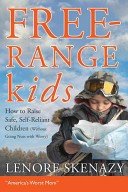 Free-Range Kids: Giving Our Children the Freedom We Had Without Going Nuts with Worry, by Lenore Skenazy (Jossey-Bass, San Francisco, 2009)
Free-Range Kids: Giving Our Children the Freedom We Had Without Going Nuts with Worry, by Lenore Skenazy (Jossey-Bass, San Francisco, 2009)
Paperback subtitle: How to Raise Safe, Self-Reliant Children (Without Going Nuts with Worry)
I've been following (and blogging about) Free-Range Kids for quite a while now, so it's about time I finally read the book. First off, in case you don't bother to read the rest of this post: Get a hold of a copy of this book and read it. If you are tempted to dismiss the free-range movement as crazy, irresponsible parenting, this will reassure you. If you're already sold on this idea, it will open your eyes to how we got to the point of needing it.
Being so familiar with the Free-Range Kids blog, and even having made some contributions myself, I thought I knew what to expect from the book. Boy was I wrong. (More)
Jonathan's birthday is coming up, and he told me what he really wants: a real Boba Fett costume, from the local costume store. (Perhaps it was Jango Fett, or Olive Fett, or some other miscellaneous Fett. I lost track of the Star Wars characters once inflation set in and Episode 1 became Episode 4.)
I expressed my surprise, because he had already created wonderful costumes—headgear and jetpacks—for himself and his siblings, out of cereal boxes, styrofoam cups, and pipe cleaners.
"I am only creative," he replied, "because I don't have what I want."
Bingo.
There, from the mouth of a six-year-old, is the driving force behind innovation.
Permalink | Read 2362 times | Comments (3)
Category Children & Family Issues: [first] [previous] [next] [newest]
I have another post on Free-Range Kids. You've probably read most of it here already, in my review of the Melendy books, but I mention it because the comments over there are brimming with other good book suggestions that you may want to check out.
Permalink | Read 2709 times | Comments (0)
Category Children & Family Issues: [first] [previous] [next] [newest]
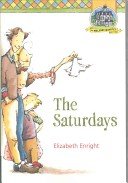
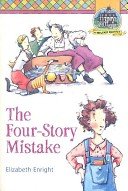
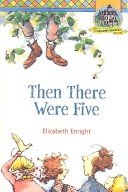
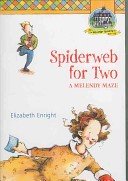
The Saturdays
The Four-Story Mistake
Then There Were Five
Spiderweb for Two: A Melendy Maze
by Elizabeth Enright (Holt/Square Fish, New York, 2008)
I've heard it said—and often by teachers—that it doesn't matter what children read, as long as they're reading. I couldn't disagree more.
Actually, there's just enough truth there to be dangerous: When one is learning to read, the very best path to the next level is merely to read, and read, and read. It doesn't matter if it's Dr. Seuss, Calvin & Hobbes, Star Wars, or Anna Karenina—almost anything will do that is decent and holds the reader's attention long enough for the practicing to work its magic. When my father was sick and terribly thin, we pressed upon him high-fat, high-calorie, high-sugar foods that would normally have been anathema to a sensible diet. (More)
Regular readers of Lift Up Your Hearts! know I'm a fan of Lenore Skenazy's Free-Range Kids blog, though I blush to admit I haven't (yet) read her book of the same name. I've written quite a few comments there, and a recent letter I sent evolved into a guest post, which you can find here: A List that Sums Things Up Nicely.
To anyone who may have wandered over from the link at FRK, welcome! Things are pretty random here, as this is where I post, for family and friends, whatever happens to be on my mind. That way they don't have to hear me talk about it quite so much. Okay, so it's really just a small portion of what is buzzing around in my brain; fortunately, life imposes time limitations.
In the upper right hand corner you'll find links to what it's all about here, and various disclaimers and disclosures. Thanks for visiting!
 Everything I Want to Do Is Illegal: War Stories from the Local Food Front. by Joel Salatin (Polyface Inc., Swoope, Virginia, 2007)
Everything I Want to Do Is Illegal: War Stories from the Local Food Front. by Joel Salatin (Polyface Inc., Swoope, Virginia, 2007)
Until now, I've written more about Joel Salatin than I've read by him: almost a year ago in Strange Bedfellows? Not Really, and three months later in my review of The Omnivore's Dilemma. Wanting to correct that sin of omission, I grabbed the only one of his books available in our local library: Everything I Want to Do Is Illegal.
On every side, our paternalistic culture is tightening the noose around those of us who just want to opt out of the system. And it is the freedom to opt out that differentiates tyrannical and free societies. How a culture deals with its misfits reveals its strength. The stronger a culture, the less it fears the radical fringe. The more paranoid and precarious a culture, the less tolerance it offers. When faith in our freedom gives way to fear of our freedom, silencing the minority view becomes the operative protocol. — Joel Salatin
Salatin wants to opt out of a little more of the system than I do, but I hear his cry. You could call him bitter, but if you consider the miracle that is Polyface Farms, you have to wonder why our government is working so hard to stamp out such elegant, inexpensive, healthy, delicious, and truly "green" (in a conservationist sense) endeavors. (More)
Permalink | Read 5253 times | Comments (1)
Category Reviews: [first] [previous] [next] [newest] Politics: [first] [previous] [next] [newest] Children & Family Issues: [first] [previous] [next] [newest] Food: [first] [previous] [next] [newest] Conservationist Living: [first] [previous] [next] [newest]
Exposure To Two Languages Carries Far-Reaching Benefits From this article at ScienceDaily, you can follow links to many other articles on bilingualism and language learning, some of which I'll also include below.
People who can speak two languages are more adept at learning a new foreign language than their monolingual counterparts, according to research conducted at Northwestern University. And their bilingual advantage persists even when the new language they study is completely different from the languages they already know. ... And they believe the bilingual advantage is likely to generalize beyond word learning to other kinds of language learning, including learning new words in one's own language and a very basic ability to maintain verbal information. ... Previous research already indicates that individuals who have formally studied two or more languages as adults more easily acquire a new language than monolinguals. New research even indicates that the onset of Alzheimer's disease in bilinguals is, on average, delayed by four years compared to monolinguals. ... The Northwestern researchers chose to study bilinguals who learned a second language at an early age and in a non-classroom study to avoid suggestions that their subjects simply were exceptionally talented or motivated foreign language learners.


